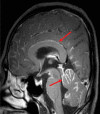Brain metastasis from colorectal cancer: Treatment, survival, and prognosis
- PMID: 36221357
- PMCID: PMC9542566
- DOI: 10.1097/MD.0000000000030273
Brain metastasis from colorectal cancer: Treatment, survival, and prognosis
Abstract
To investigate the clinical characteristics, survival, prognostic factors, and treatment of brain metastasis (BM) from colorectal cancer (CRC). Twenty-one patients with BM from CRC were retrospectively reviewed. Predictive factors for BM and prognostic factors after the diagnosis of BM were examined by univariate and multivariate COX analysis. The time from the development of extracranial metastases, including lung, bone, and liver, to the occurrence of BM was recorded separately. The median overall survival time was 7 months. In univariate prognostic analysis, median survival with multimodal therapy was better than that with unimodal therapy (10 months vs 3 months, P = .000). In addition, median survival with Karnofsky performance status (KPS) < 70, 1 BM lesion, primary tumor stage of II-III, extracranial lesions < 2, and no extracranial metastasis were much better than the other groups (P < .05 of all). Although there was not a significant difference in median survival between patients receiving combination treatment with bevacizumab and those who did not, treatment with bevacizumab was associated with better survival (10 months vs 5 months, P = .436). The time intervals from bone, liver, and lung metastases to BM were 3, 6.5, and 11 months, respectively. Based on multivariate Cox analysis, KPS and treatment modalities were independent prognosis factors (P = .039 and P = .000, respectively). CRC patients with a high KPS and multimodal treatment have improved survival.
Copyright © 2022 the Author(s). Published by Wolters Kluwer Health, Inc.
Conflict of interest statement
The authors have no funding and conflicts of interest to disclose.
Figures
References
MeSH terms
Substances
LinkOut - more resources
Full Text Sources
Medical




